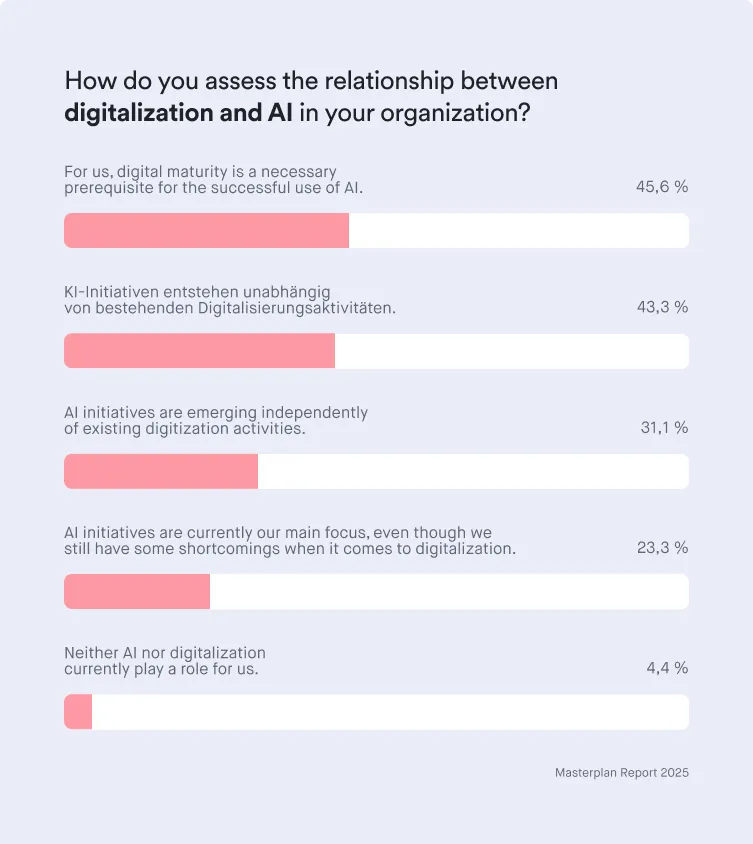
AI is on everyone’s lips — yet only a handful of companies use it with real confidence. The problem is rarely a lack of enthusiasm, but more often a crumbling foundation: inadequate digital skills. Without them, AI remains an empty promise. The key question, then, is this: How can organizations now build the digital capabilities that pave the way for successful AI adoption?
- Digital skills go far beyond simply operating technology — they include critical thinking and the strategic use of digital tools.
- Seven core competencies form the foundation: basic digital literacy, data literacy, digital communication, content creation, cybersecurity, problem-solving, and adaptability.
- The digital skills gap is wide: in Germany, only about half the population has at least basic digital knowledge.
- The AI readiness gap tells a similar story: 98% of companies want to use AI, but only 13% are fully prepared.
- Training is the key to productivity, innovation, and competitiveness — and it must be continuous and grounded in real-world application.
- Organizations that invest now in developing targeted digital skills will secure lasting success in the AI era.
What Are Digital Skills?
Digital skills are far more than just knowing how to operate a device or install an app. They are an absolute must-have for navigating a world that is increasingly connected and driven by technology.
At their core, digital skills mean not only understanding and using technology, but also questioning it critically and applying it strategically. It’s about quickly adopting new innovations, spotting opportunities early, and managing risks effectively.
7 Digital Skills Every Employee Should Master
In practice, digital skills range from confidently using software and communicating virtually to performing advanced data analysis and shaping digital transformation processes.
The core competencies for digital maturity are:
1. Basic Digital Literacy
The foundation of digital work: confidently handling devices, operating systems, and common software, as well as understanding digital processes, interfaces, and workflows.
2. Information and Data Literacy
The ability to purposefully search for, evaluate, and prepare information from digital sources, and to analyze data in order to generate actionable insights.
3. Digital Communication and Collaboration
Effective use of email, chat, video conferencing, and collaboration platforms to build trust, strengthen teamwork, and stay connected even without physical presence.
4. Creation and Design of Digital Content
Using creative tools to produce and edit text, presentations, images, and videos, ensuring messages are communicated effectively and with impact.
5. Digital Security and Data Protection
Understanding key cybersecurity risks and protective measures — from secure passwords and phishing awareness to ensuring compliance with data protection regulations.
6. Problem-Solving and Innovation
Leveraging digital tools to tackle challenges, streamline processes, and generate new ideas — even in fast-changing environments.
7. Adaptability and Lifelong Learning
Staying open to new technologies, quickly learning new tools, and continuously developing one’s digital skills to keep pace with innovation.
Digital Skills – The Overlooked Foundation of Any AI Strategy
In today’s workplace, digital competencies determine whether employees can remain competitive in an increasingly connected world — and whether companies can truly harness the opportunities of digital transformation.
Organizations and employees with a strong digital skill set don’t just keep up; they help set the direction for a successful future. That’s the ideal scenario.
The reality, however, often looks different. A significant digital skills sgap separates the abilities that are needed from the ones that actually exist:
- By 2030, the EU’s official target is for 80% of adults to have at least basic digital skills. As of 2023, only 56% had average or advanced digital competence.
- According to the D21 Digital Index, by 2024/25 only 49% of the population possessed basic competencies.
- In Germany’s SME sector, almost one in four small and medium-sized enterprises in 2025 reported gaps in their employees’ digital capabilities.
{{blog-digital-skills-digital-skill-gap-en="/custom-rich-text"}}
Masterplan Report 2025: Digital and AI Skills Are Deeply Intertwined
In the context of artificial intelligence, the consequences of lacking digital skills become especially clear. The takeaway is simple:
AI skills stand or fall on the foundation of digital literacy.
The Masterplan Report 2025 (German) makes this point unmistakable:
- 85% of those with a (very) low level of digital maturity also rate their AI maturity as (very) low.
- By contrast, among those who consider their organization digitally strong, almost half (49%) also view it as (very) well prepared for AI.
AI delivers its potential far more effectively in companies that already have scalable digital processes, interconnected infrastructure, and a culture of continuous learning. Without this foundation, both basic and ambitious AI projects often end up as fragmented efforts.
The unvarnished truth for many organizations: digital competence is still far from the level required for productive AI use — and this opens up yet another gap.
From the Digital Skills Gap to the AI Readiness Gap
The AI readiness gap is the widening divide between companies’ high ambition to use AI and their actual ability to do so.
Most businesses feel the pressure to act — but only a few are truly ready. According to Cisco’s AI Readiness Index:
- 98% of companies feel compelled to adopt AI quickly.
- Only 13% say they are fully prepared.
For one in three companies, one of the biggest barriers to implementing AI initiatives is a lack of internal expertise — often caused or compounded by insufficient digital skills.
The Masterplan Report 2025 (German) shows that many organizations underestimate digital maturity as the essential basis for successful AI implementation:
- Fewer than a third (31.1%) say both topics are addressed together in their organization.
- 45.6% see digital maturity as a necessary prerequisite for successful AI use.
- Almost as many (43.4%) say AI happens independently of ongoing digitization measures.

Bottom line: The AI readiness gap is real — and it’s alarming given the profound changes AI is already bringing to today’s workplace, and will bring even more so in the future. Despite clear urgency, organizations still struggle with gaps in infrastructure, data, culture — and, most importantly, the fundamental digital skills that underpin it all.
More Productive, More Innovative, More Competitive — Thanks to Digital Upskilling
Developing digital skills through targeted training is the key not just to keeping pace with digital transformation, but to actively shaping the AI era.
The structured (and ongoing) development of digital processes and mindsets empowers employees to work more efficiently in online environments, unlock the full potential of technology, and cultivate the digital mindset needed to stay agile and competitive in a fast-moving workplace.
Truly effective training focuses on essential topics and blends a variety of learning formats to maximize impact.
Key Topics for Digital Skills Training
The field of digital transformation is vast — and so are the opportunities for upskilling. Popular course topics, especially at the start of digitization initiatives at Masterplan, include:
- Foundations of Digitalization: From technological developments to cultivating the right mindset — a comprehensive course series that brings all employees along on the digital transformation journey.
- AI Fundamentals: Opportunities, risks, and real-world applications — an essential introduction to integrating AI confidently and responsibly into everyday work.
- Compliance: Understanding rights, obligations, and internal guidelines in the digital workplace, and learning how to reduce the risk of compliance violations.
- Data Literacy: Gathering, interpreting, visualizing, and drawing meaningful insights from data — comprehensive data literacy training to evaluate and leverage data effectively.
- Digital Tools: Practical training in the secure use of Google Workspace, Microsoft Office, Adobe Creative Cloud applications, and leading communication tools.
{{blog-use-case-link-digital-transformation-en="/custom-rich-text"}}
Formats for Digital Skills Training
In workplace learning, a variety of formats are effective for building digital competencies, including:
- Online Courses: Delivering digital knowledge through digital methods — self-directed, certified, and customizable online modules and learning paths on a dedicated platform.
- Blended Learning: Combining flexible, self-paced online modules with live workshops and in-person sessions for a diverse and engaging learning journey.
- Learning by Doing: Ideally, employees already working at their computers daily engage hands-on with new technologies in real work contexts, applying them immediately and developing their skills through intrinsic motivation.
{{blog-digital-skills-learning-culture-en="/custom-rich-text"}}
Conclusion: Build the Digital Foundation for AI Success — Now
In the context of artificial intelligence, one truth stands out: without a solid digital foundation, AI remains untapped potential. Digital competence is not just a skill set — it’s the entry ticket to the AI era. And that era demands active shaping, not just reactive adaptation.
Companies that invest systematically in digital skills today secure lasting strength and agility for a successful AI-driven future.
Targeted upskilling delivers a triple win:
- Employees gain greater career flexibility.
- Businesses boost innovation and competitiveness.
- Together, they navigate the AI era with confidence.
One thing can already be said with high certainty: the future belongs to those who learn, shape, and grow responsibly with AI — and to the organizations that make this possible.
{{blog-digital-skills-development-en="/custom-rich-text"}}
How Masterplan Supports You and Your Organization
With Masterplan, you develop the capabilities that truly drive digital transformation forward:
- Learning content on digitalization, AI, communication, and leadership.
- Practical expertise in change management, mindset, and future skills.
- Personalized growth maps and AI-powered learning paths.
- A strategically integrated learning platform for all areas of the business.
Our goal: turning tool training into real transformation. Turning upskilling into lasting change.
